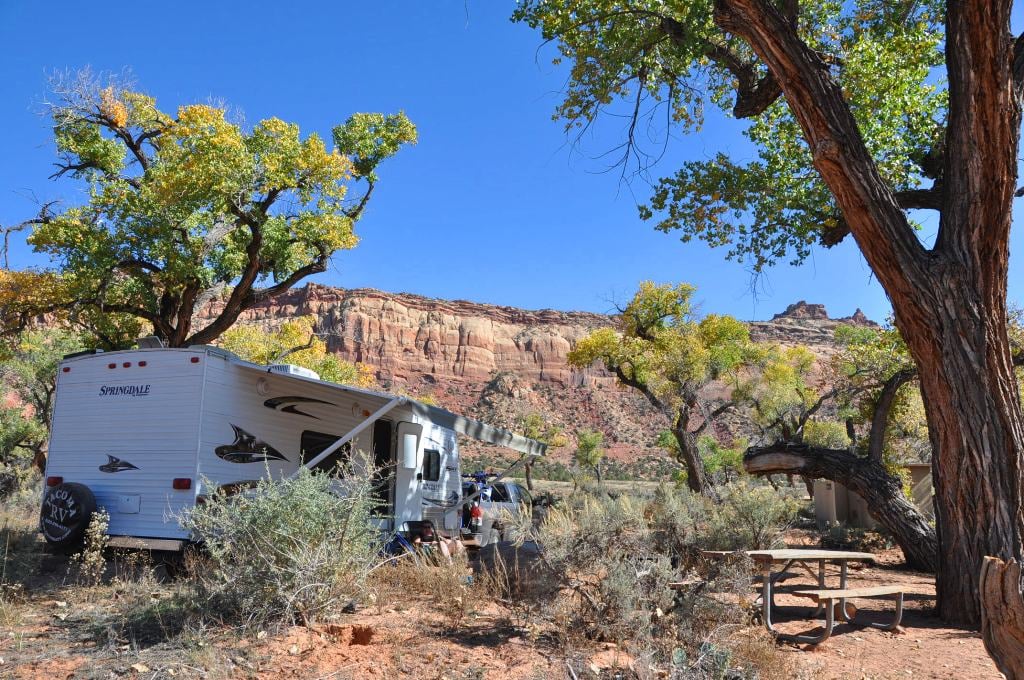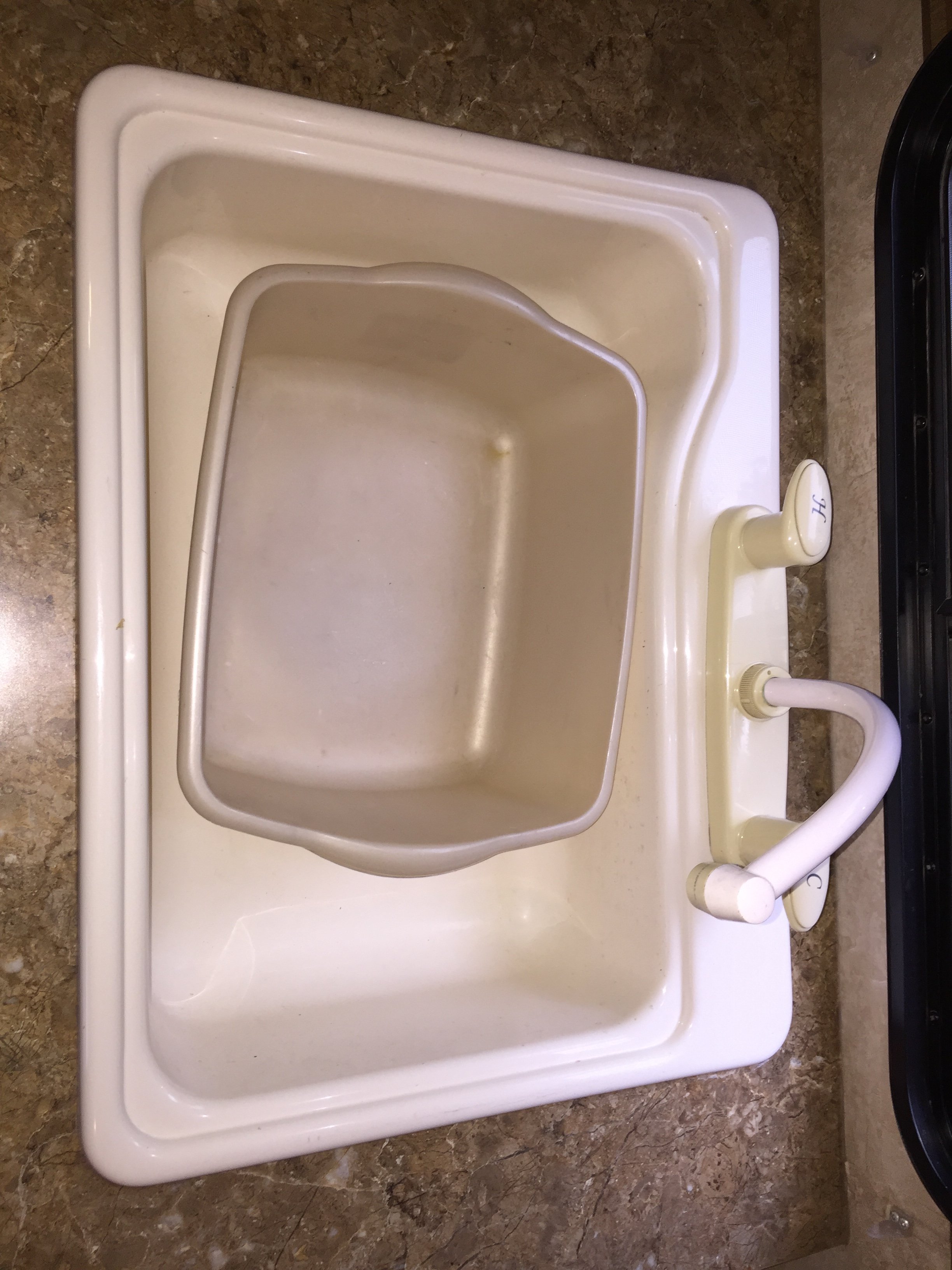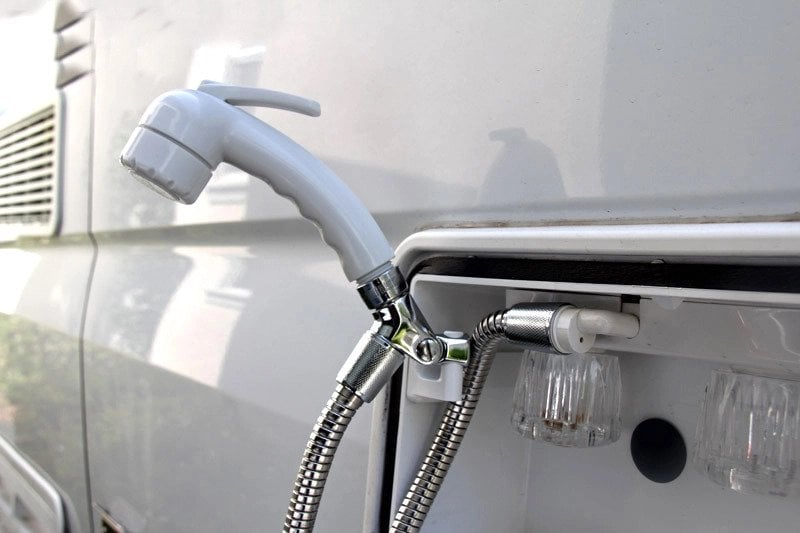Table of Contents
show
Typically, managing gray water is the main challenge for most RVers when dry camping for extended periods. Most RVers generate way more gray water than black water and will fill up the tank by days or even weeks ahead of the black tank. Follow these tips to help limit the amount of gray water you generate and the amount that enters your gray tank.

Don’t let a full gray tank force you to leave a scenic dry camp like this. Photos via Dave Helgeson
1. Use paper plates and compostable disposable silverware that won’t need to be washed.
2. Cook meals ahead of time to reduce the amount or water used during meal prep and washing pots, pans, and utensils afterward.
3. Use paper towels or the paper napkin used during your meal to wipe debris from your plates before washing.
4. Use less dish soap and you won’t have to run as much water down the sink drain to rinse them. Not only do the above tips save gray water going down the drain to your gray tank, but also conserve precious fresh water.

Use a dishpan to catch dishwater
5. Wash your dirty dishes in a dishpan that fits in your kitchen sink. Use the captured dish water to:
- Water a thirsty bush in the boondocks where it is legal to do so. Know the “Dispersed Camping” rules for where you plan to camp. You can typically do an online search using the name of the land agency where you plan to boondock along with the words “dispersed camping.” For example, if you search “Willamette National Forest Dispersed Camping” you will end up on a webpage showing the rules for dispersed camping in the Willamette National Forest and rules stating you may dispose waste water at least 100 feet from any water source. Beware that different governmental agencies sometimes have different definitions of “gray water,” “dish water,” and “waste water” than RVers. If in doubt of what you can or can’t do, call the land agency. Even when legal, please be discrete and don’t make a mess when disposing of waste water.
- Take advantage of the extra space in your black tank and pour it down the toilet. The soapy water will help keep your holding tank probes clean and the extra liquid will help keep solid waste covered, meaning you won’t need to use as much water when flushing.
- Pour it into a one-gallon milk jug and use it to flush the toilet in place of water from your fresh water tank.


Another option, if you’re tow vehicle is a truck, is to carry a large waste tote & have a macerator in the rv, either portable or permanently attached. That allows you to pump grey or black water up into the truck & take it any distance to dispose of it. I carry a 35 gal waste tote in my truck & have a macerator that increases my grey water capacity from 70 gal. to 105 gal. Add a 90 gal vinyl fresh water bladder & we can boondock indefinitely without ever having to move the rv.
Propane?
How about an outdoor hand washing station? Use 2 tubs; one with soapy water and another with clean water. When either water tub gets too ‘dirty’, add some soap to the ‘clean’ water tub and empty the soapy water tub. Refill with clean water. Repeat. And you’ll need an old towel too.
Good article! But don’t clean fish near the RV — it attracts bears! Also, for faster rinsing of the dishes, use an easy rinse soap, like Dr. Bronner, in a diluted solution.
good tips, all of them. I use what I call “utility cloths” that I made from colorful old dishcloths or cheap cloth napkins that are easy to spot. You can use them to wipe grease from pans, wipe up spills on floor, wrap washed vegetables to keep fresh… you will discover a lot of uses. Yeah, you have to wash them, but you save a LOT of paper towels.
I think that you are advocating too much use of disposable paper products that will end up in a landfill. Far better to rinse dishes in a dish pan and dump out the dishpan. Water a tree with it. Also, the “navy bath” is an excellent way! However, go one step further. Get a high quality, made for the body, microfiber. With it, you can wash without soap so rinsing is even easier. Sorry, no suggestions for replacing shampoo yet! Lol….
Dawn dish detergent….biodegradable & and works on animals too.
Waterless shampoos are available. You can check with your local hospital to find out what types they use.
If you’re allowed to have a camp fire those paper products can be burned.
Shave your head like I did. Problem solved
As suggested by Ken use 2 containers of water, soap and clear, and use cloth not paper it just adds to landfill.
In addition to the campfire comments above, grey water is an excellent way to make sure the fire is completely out.
We keep a spray bottle by the sink with a solution of Dawn, water and vinegar. We spray down our dishes with this solution, wipe them clean, then just dribble water from the sink to rinse them. (Catching the water in a dishpan of course, and disposing of it outdoors). This saves on fresh water as well as keeps the gray tank from filling as quickly.
Any particular ratio of ingredients of dawn, water and vinegar?
I have two 30 gallon grey tanks, one for the galley and one for the shower & sink in the bathroom. They both have separate waste valves that flow into one 3″ waste outlet. I just carry another waste valve that I connect to the 3″ waste outlet and then open both the galley and shower waste waste valve and let the tanks balance to each other. Resulting (in my case) a a combined 60 gallon grey waste tank.
Never understood why it is ok to dump the dishpan full of soapy water and food waste outside, and not ok to dump the grey tank that holds the exact same as the dishpan.
Robbie its NOT ok.
Its illegal AND just plain gross.
Imagine everybody thinking that it is OK.
I would never leave my house!
Hoping someone can help me. I am converting a shuttle bus into a home and made the mistake of having the shower drain sitting below my grey water tank. (Just stupid)
Is there any way I can get the shower water up into the grey tank?
Thanks for your time….best wishes
Ron
Ron,
Do not use a macerator (will run dry and fail) or freshwater diaphragm pump (will clog the check valves). The boating world has a solution. Get a ‘gulper’ gray water transfer pump. (search for ‘gulper pump’). It uses a low-speed rubber diaphragm ‘trash’ pump designed to move debris-laden water….switch it on, take your shower then switch it off. It can ‘run dry’ or under capacity without damage. They are not cheap but it is probably the best solution.
the ideal solution is if you can get another grey water tank lower than the shower drain then plumb it with its own gate valve to the main tank discharge. Otherwise, you could use a macerator to pump it up to the existing grey tank. The macerator may need a small holding tank (big enough for 1 shower) itself as you would not want it to run without water to pump. I don’t know if a standard water pump would work or not, but if you want to chance it, water pumps are cheaper and use less power than macerators.
Hey Ron,
Boat bilge pumps are 12vt, and have a float activated switch. Put anything under the shower pan drain like a bucket, Tupperware bin, etc. and bilge pump the shower water anywhere you want.
Dumping your grey water on a tree is dumping illegally your grey water.
Same would go for the campfire.
There is no difference . Your intent does not change the result.
Now do I need to mention outside showers?
I’m pretty sure the legality of gray water dumping is all about the, a) food waste (decomposition smells and creates an animal attraction), b) soap and c) your ability to ‘collect’ (my term) wastewater. This means;
1) If you have an RV OR are car camping with an ‘outdoor kitchen’ setup with any type of wastewater ‘collection’, (in either a shower or sink, including with a wash tub in the sink) NOTHING COLLECTED CAN BE DUMPED ON THE GROUND. Once collected, it can only legally be discarded in a sanitary sewer.
2) I believe that ‘outdoor showers’ are technically supposed to be used with either no soap or biodegradable soap and since the water is not ‘collected’, it can be ‘discharged’ on the ground legally. I’ve looked into using a ‘shower bypass’ in my RV that dumps only the shower water on the ground. I believe, even with biodegradable soap, it is NOT legal because it is ‘collected’ by the shower pan which incurs the obligation to store and dispose of in a sanitary sewer.
3) I believe that if you are car camping or backpacking without any means of wastewater storage (even if you wash in a basin), you can legally dump wash water (using biodegradable soap, even though it has food waste).
I believe these three things make rational sense and should be followed if you want to be considered a responsible camper.